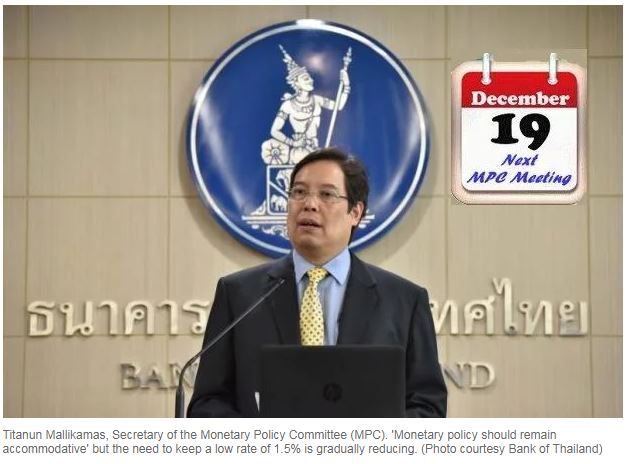Thailand: Rate stands in tighter vote
The Bank of Thailand kept its policy rate unchanged yesterday, but the close vote of 4-3 added to the likelihood of the first rate hike in more than seven years at 2019’s final meeting in December.
Four members of the Monetary Policy Committee (MPC) voted to hold the rate steady at 1.50%, while three voted for a quarter-point increase, up from two votes at September’s meeting and one in August and June.
The three members viewed the continued economic expansion as sufficiently robust and argued that prolonged monetary accommodation had induced households and businesses to underestimate potential changes in financial conditions, said MPC secretary Titanun Mallikamas.
The trio voted to raise the policy rate to curb financial stability risks that could affect the sustainability of economic growth in the longer term and to start building up room for policy space, Mr Titanun said.
The MPC decided that the current accommodative monetary policy stance remains conducive to the continuation of economic growth, though the need for accommodative monetary policy is to gradually decline.
Thailand’s economy as a whole continued to gain traction despite signs of slowing export growth caused in part by trade protectionism measures taken by the US and China, a slowdown of the electronics cycle and temporary weather conditions in trading partner nations, Mr Titanun said.
Domestic demand momentum continued. Private consumption is expected to expand on the strength of improvements in income and employment in the non-agricultural sector but is being restrained by elevated household debt.
Private investment growth is to continue amid relocation of production to Thailand and public-private partnership projects for infrastructure investment.
Public expenditure is expected to grow at a slower pace than previously assessed, due to delayed investment by some state-owned enterprises.
Mr Titanun said the overall economy will continue to expand while facing increased downside risk from trade protectionism, which could have a larger impact than expected.
The committee deemed it necessary to monitor household debt accumulation and the debt serviceability of small and medium-sized enterprises, especially those affected by changes in structural factors and business models.
With the narrower vote in favour of standing pat, the expectation is that the central bank will start the monetary policy normalisation process with a 25-basis-point rate hike at the MPC meeting on Dec 19, said Tim Leelahaphan, an economist at Standard Chartered Bank Thailand.
“The central bank may be less concerned about rapid currency appreciation, which gives it room to hike,” Mr Tim said.
The baht has depreciated 0.9% against the greenback on a year-to-date basis, making it Asia’s best-performing currency, according to Reuters.
Any hike would be data-dependent, based on Thailand’s third-quarter GDP reading, October export data, the central bank’s monthly economic numbers and November’s inflation figures, Mr Tim said.
The central bank is increasingly concerned about risks to economic growth from a prolonged period of low interest rates and increased vulnerability in the property sector due to speculative buying and search-for-yield behaviour, he said.
The committee is of the view that macroprudential measures alone are insufficient to contain such risks, Mr Tim said.
Roong Sanguanruang, head of global market research and analysis at Bank of Ayudhya, seconded Mr Tim’s view, predicting the start of normalisation in December.
Source: https://www.bangkokpost.com/business/news/1576062/rate-stands-in-tighter-vote


 Thailand
Thailand




